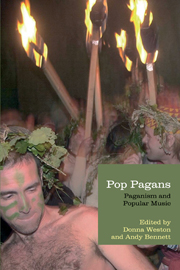Book contents
7 - Paganism and the British folk revival
from Part II - Genres
Summary
Folk music in Britain has never been more popular. A nationwide calendar of folk festivals and a thriving scene of folk clubs, pub sessions and ceilidhs support a body of professional and semi-professional artists and a groundswell of amateur players. Newcastle University runs a popular folk music degree course, the mainstream media review the major folk releases and artistic accomplishment is recognized through the BBC Radio 2 Folk Awards. In 2006, BBC 4 produced an acclaimed three-part documentary about the history of the folk revival, Folk Britannia, and in 2010 the editor of The Wire magazine, Rob Young, published his monumental and even broader history, Electric Eden: Unearthing Britain's Visionary Music, to plaudits from both the literary and musical worlds.
In spite of this success, “folk” remains a contested term. It is not easy to say with any great precision what does or does not count as folk music (added to this, the term has rather different connotations within the different Anglophone nations). Because folk music is, by definition, so bound up with notions of tradition and authenticity, what it signifies has come to be every bit as important as what it sounds like and how it is played. Consequently, its borders are continually being negotiated.
- Type
- Chapter
- Information
- Pop PagansPaganism and Popular Music, pp. 91 - 109Publisher: Acumen PublishingPrint publication year: 2013



